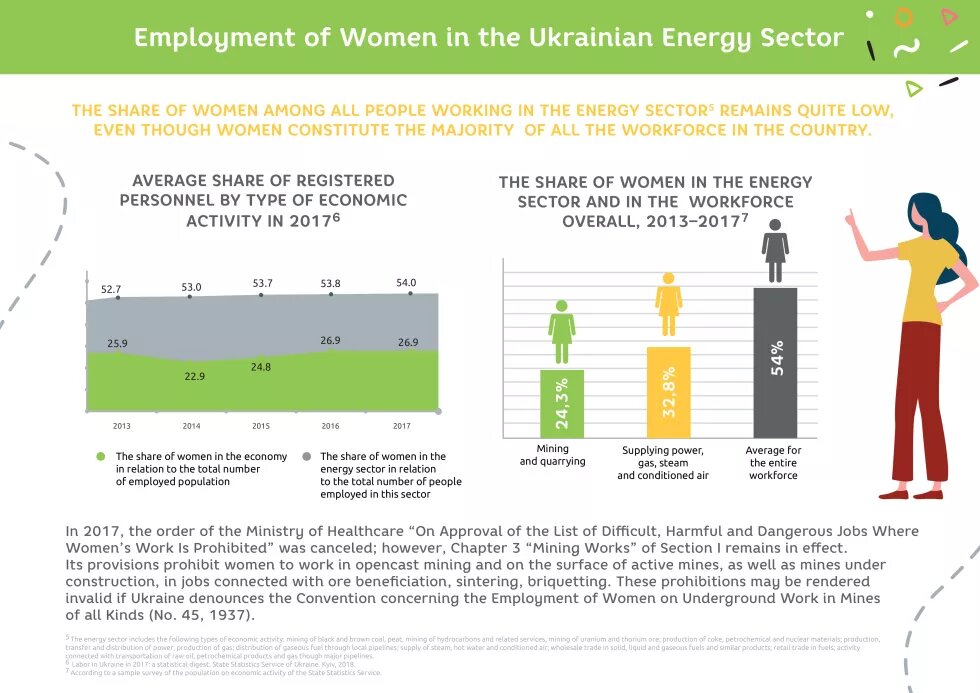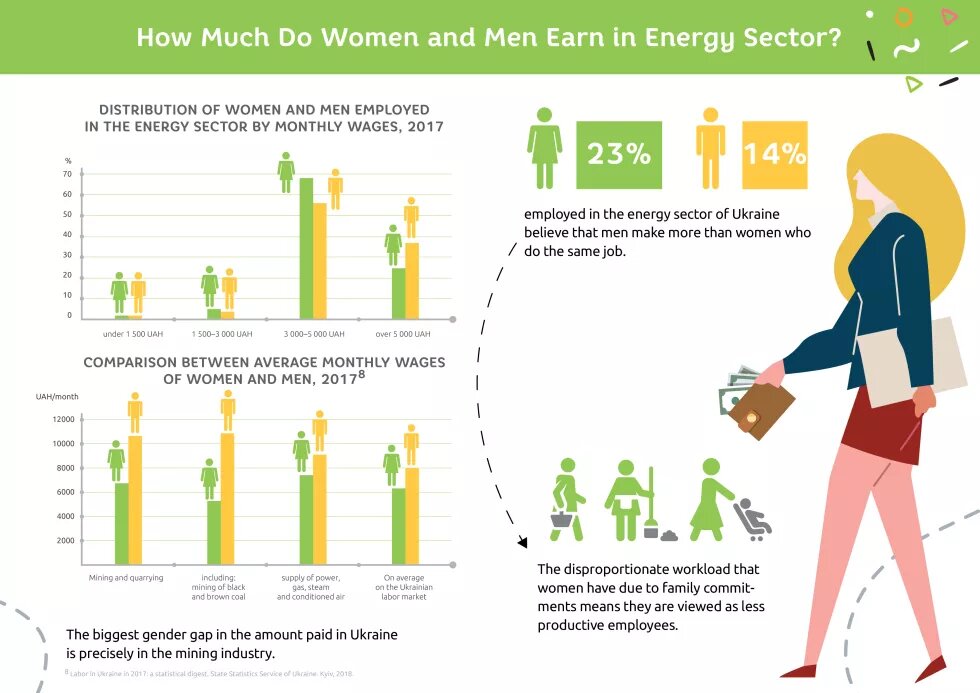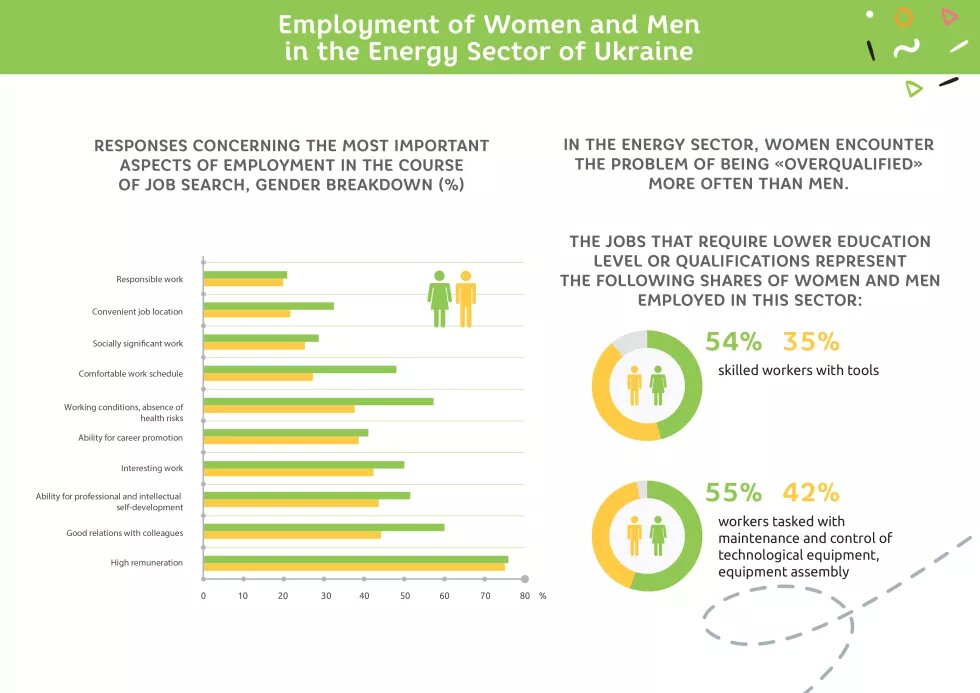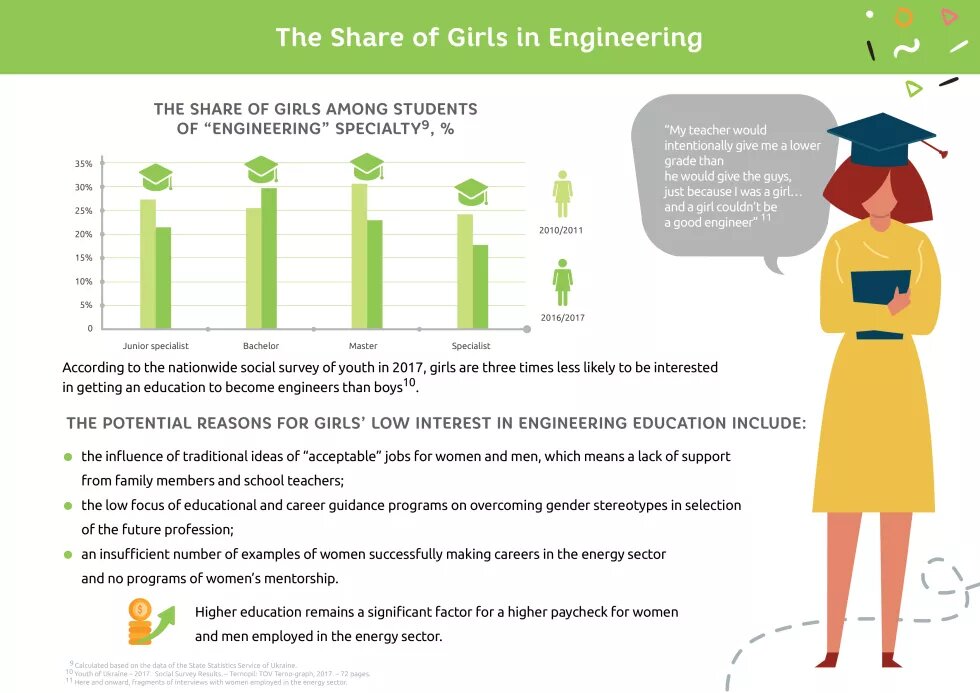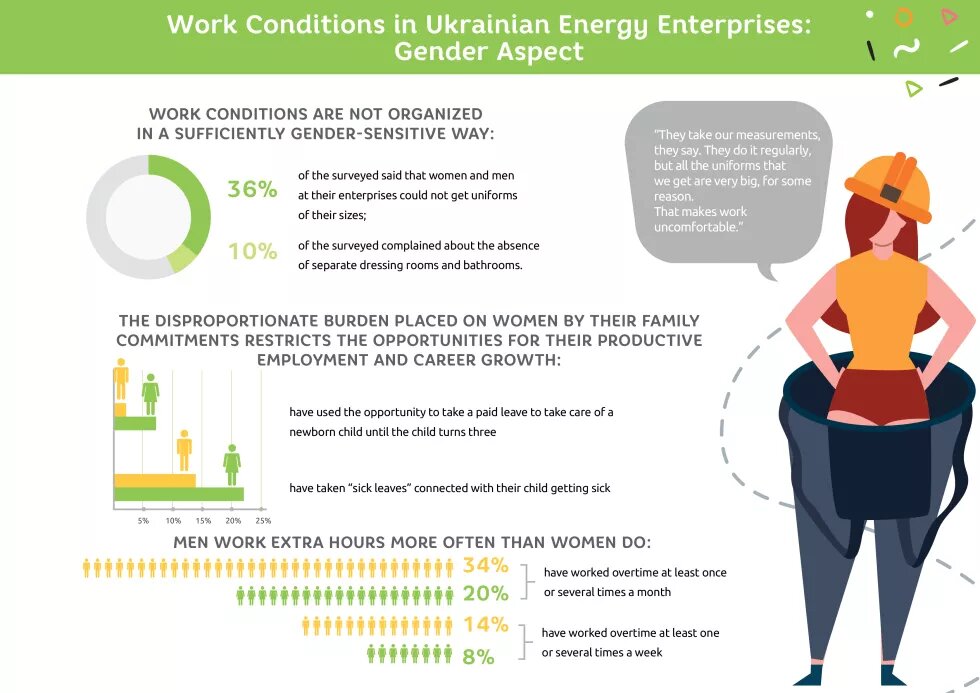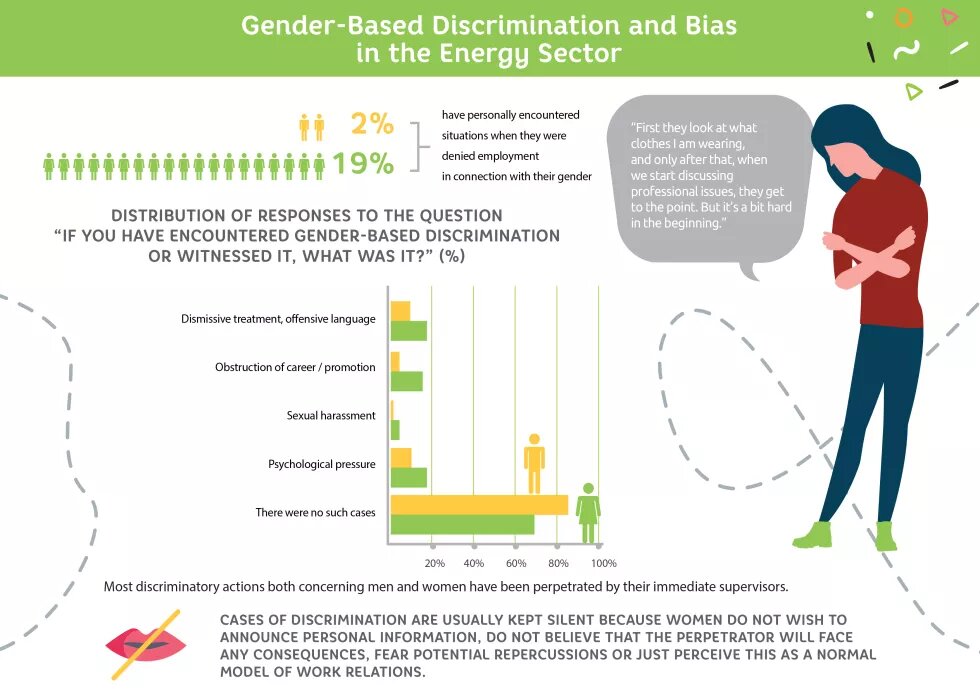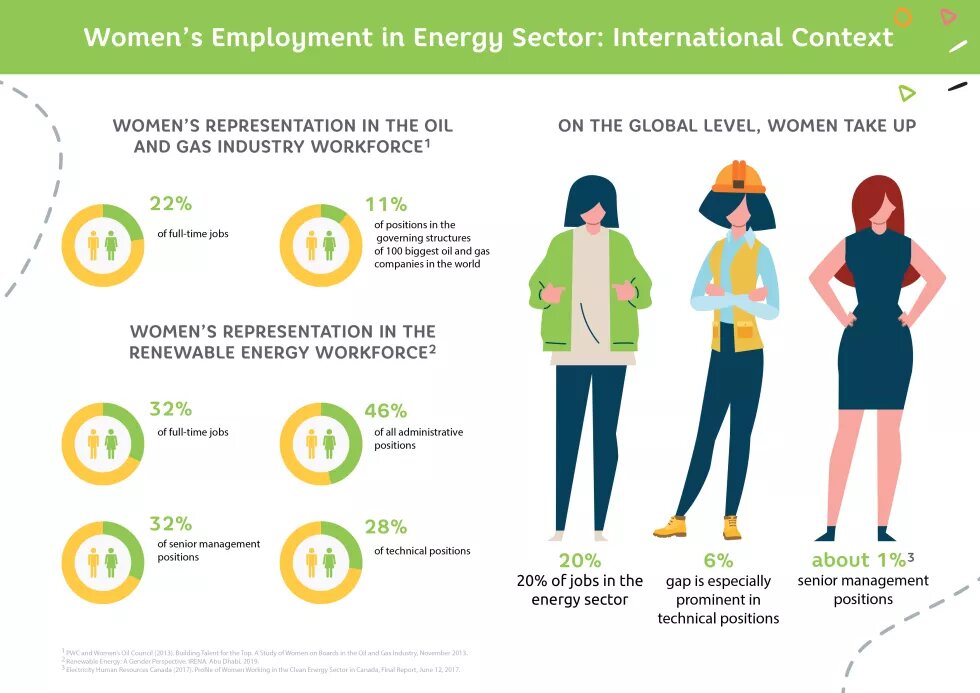
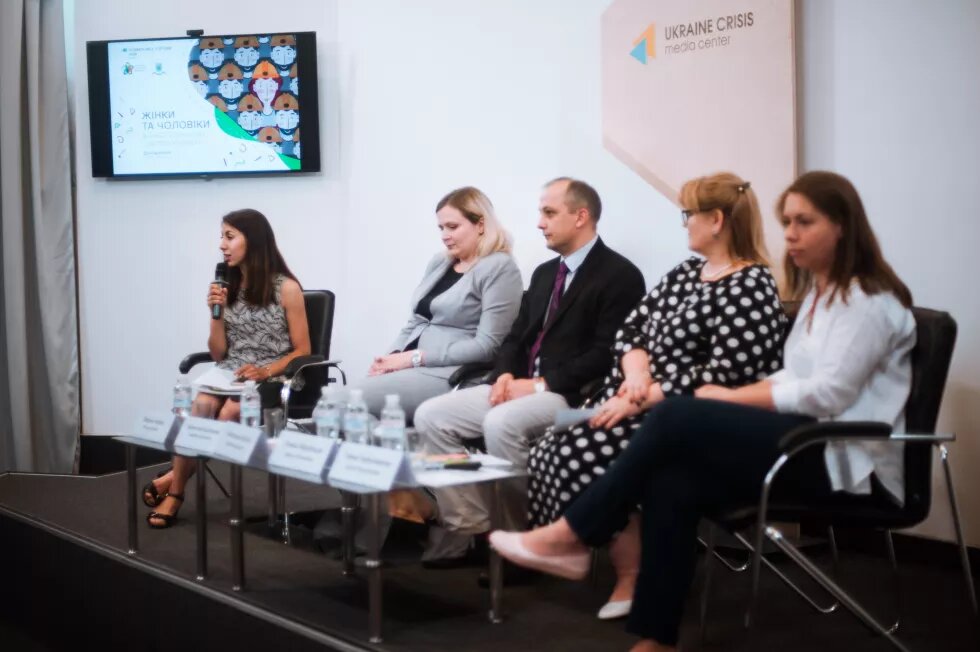
Last week, presentation of the research “Women and Men in the Ukrainian Energy Sector” was held. The research was conducted during 2018 and early 2019 to identify possible ways to resolve the problem of gender imbalance in the Ukrainian energy sector in order to ensure its sustainable and socially fair development.
The research was conducted by the state institution “Institute for Economics and Forecasting of the National Academy of Sciences of Ukraine” at the initiative, and with the support, of Heinrich Böll Foundation, Kyiv — Ukraine Office and Women’s Energy Club of Ukraine with active facilitation and support of the apparatus of the Government Commissioner for Gender Policy.
Here, we publish key outtakes of the research presentation.
“Gender mainstreaming is one of the cross-cutting objectives of Heinrich Böll Foundation. This is why, working in the sector of energy policy in Ukraine, we could not stay aside, understanding that the energy sector is still far from friendly when it comes to women’s employment. This research gives us an opportunity to understand what the situation is like now and on what we should base our attempts to find ways to reduce the gender gap in the Ukrainian energy sector,” said Oksana Aliieva, coordinator of the Climate Change and Energy Policy Program with Heinrich Böll Foundation in Ukraine at the beginning of the presentation, outlining the goal of the research.
Halyna Zhukovska, PhD in Public Administration, Senior Secretary with the Apparatus of the Government Commissioner for Gender Policy, talked about the situation with providing equal rights for women and men overall and in employment in particular: “Observance of the principle of equal rights and opportunities for women and men in all aspects of life is not only a way to social justice, but also a prerequisite for successful processes and reforms in the context of European integration. The national policy of ensuring equal rights and opportunities for women and men is comprehensive and aims at gender integration in all reforms and sectors. The research ‘Women and Men in the Ukrainian Energy Sector’ will enable us to plan specific action for authorities, employers and labor unions to ensure gender equality in employment, specifically in the energy sector.”
Oleksandr Diachuk, PhD in Technical Sciences, head of the group of authors of the research representing the state institution “Institute for Economics and Forecasting of the National Academy of Sciences of Ukraine” said that as part of the research, several data collection techniques were used, over 30 enterprises, institutions and organizations of various specializations were interviewed, 15 in-depth interviews and focus groups were held, about 500 men and women were surveyed at enterprises, national regulatory framework and foreign experience were analyzed.
“Resolving gender issues, we simultaneously improve Ukraine’s social and economic development. By providing gender equality on all levels, among other things, we create truly competitive work conditions, where preference is given based on best knowledge, which will undoubtedly increase the country’s economic effectiveness and citizens’ wellbeing.
“Having limited opportunities, we have obtained, for the first time in Ukraine, comprehensive research results, that not only illustrate problems of gender inequality in the energy sector, but also provide real recommendations how to resolve them,” says Oleksandr Diachuk.
Results of the research on problems of gender inequality in the Ukrainian energy sector were presented by Hanna Herasymenko, PhD in Economics., Senior Fellow with M.V. Ptukha Institute for Demography and Social Studies under the National Academy of Sciences of Ukraine, science editor. The research shows that even though the share of women in this sector is gradually growing, they still constitute only 25-27% of all the national oil and gas industry workforce.
The main barriers to women’s employment in the energy sector are:
- Restrictions of women’s employment in certain professions with difficult or dangerous work conditions;
- Lack of women with a degree in STEM-oriented fields;
- Absence of a work environment friendly to employees with family commitments (lack of remote employment opportunities, remote location of work sites, rigid schedules, etc.);
- Influence of traditional ideas on the distribution of gender roles in the society, which determine the gender segregation of the labor market by professions and occupations;
- Restricted opportunities of career growth caused by the bias against women employed in the traditionally “male” sectors (the so-called “glass ceiling”);
- Insufficient implementation of gender-sensitive recruitment strategies, absence of gender-based development goals in energy companies;
Few examples of successful role models for women to follow.
;
A quarter of women employed in the Ukrainian energy sector believe that men are paid more for the same work than women. The biggest wage gaps in Ukraine are observed in the mining industry.
The researchers have discovered an interesting correlation between the segment of the energy sector and the level of gender inequality: newer segments, such as renewable energy, have a lower level of gender inequality than the traditional energy.
A third of women encounter discrimination in the workplace. Most instances of discrimination both against women and against men have been perpetrated by their immediate managers.
Some promising focus areas for increasing women’s engagement in the energy sector are as follows:
- Start of career: encouraging women to get higher education in STEM-oriented majors;
- Making work conditions more attractive: development of remote jobs, flexible schedules, policy of balance between employees’ professional and personal life, taking into account the gender component in planning of enterprise infrastructure;
- Professional development opportunities: introducing leadership and mentorship programs for women, promoting examples of female employees who managed to build a career in the energy sector;
- Appointment for management positions: eliminating artificial barriers to female mid-level managers’ promotion to top management, compliance with the principle of gender balance in key management positions, implementation of gender quotas in top management;
- Fighting gender stereotypes and discrimination: awareness and advocacy campaigns aimed at changing stereotypical attitudes in public opinion which determine professional gender segregation; prevention of any forms of gender-based discrimination and harassment in the workplace; gender audit of enterprises.
“It is increasingly widely recognized in developed countries that gender diversity of employees and improving women’s access to key positions are prerequisites of sustainable development of energy and the transfer to clean energy sources. For this reason, governments and leading industrial companies make effort to eliminate obstacles and barriers that restrict women’s employment, to implement inclusive strategies of corporate development and to set gender-based objectives for companies. It is no less important to encourage young women to study technical sciences, which is a must for innovative development potential, and to change the stereotypes that still dictate ‘acceptability’ of certain professions for women or men,” says Hanna Herasymenko.
Valentyna Beliakova, president of Women’s Energy Club of Ukraine, director of TIU Canada in Ukraine, speaks about career difficulties faced by women in the energy sector: “For change to happen in the society, not only in terms of legislation but also on the moral and ethical level, it is necessary to understand and clarify the problem of inequality when it comes to women’s access to information, to decision-making, to career growth and wage equality. This is why this research has been carried out. It provides a full overview of where the problem starts — in upbringing, in universities or in further activity. When we have the big picture of the existing facts, it is easy to identify a course of action and to start making progress — but we can only do it together, which is why we urge everyone to join the women’s club.”
The full research “Women and Men in the Ukrainian Energy Sector” is publicly available on our website with key results represented as infographics. You can get printed copies in our office in Kyiv, having written us beforehand. We can also send us a copy to any other place in Ukraine — send us a message and we will take care of everything.
